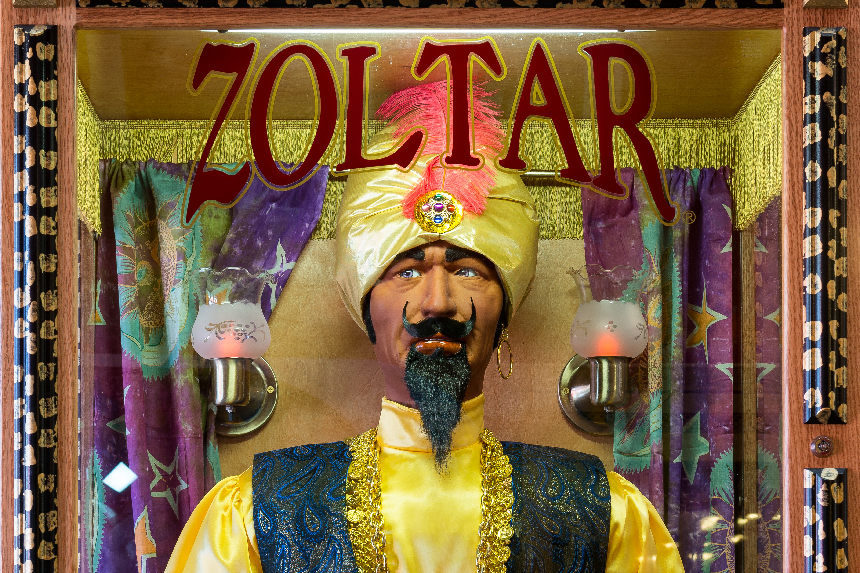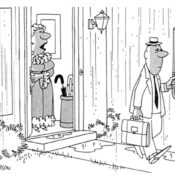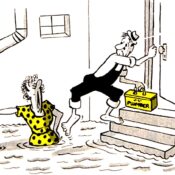“You emerge from your recent fog and get down to business,” the yellow card read.
It had been mechanically ejected from a large box holding the head and torso of a turbaned figure. His name was Zoltar, and we had fed him one dollar to tell us the future.
The Zoltar machine sat outside a candy store in Monterey, California, and we had just come out and taken off our masks. There was no one nearby, and Zoltar likely did not have COVID-19. Plus, he was wholly encased in glass: a model citizen in 2020.
(The turban, though, was vaguely troubling. Was it still okay for Zoltar to wear, or “appropriate,” a gold silk turban? What kind of name was Zoltar, anyway? It was possible that Zoltar’s history — his entire existence — was offensive, though he had starred in a harmless-seeming Tom Hanks movie in 1988. Tom Hanks was, as far as anyone knew, still okay. 1988 seems like a long time ago, however.)
After a few cryptic remarks, Zoltar produced a yellow card labeled “Your Fortune.” I perked up at the line about emerging from a recent fog. I had, indeed, been in a fog! How did Zoltar know me so well?
On second thought, it was mid-2020: Everyone had been in a fog.
“Life becomes more serious and realistic,” the card continued in an eerie present tense. “There is a need for good business judgment right now.”
Using possibly poor business judgment, we had taken the kids on vacation. We’d gone to the beach and social-distanced while gazing searchingly into the ocean, as if it held the answers to recent events. Was the country falling apart? Would American life ever go back to normal? Or was normal life in 2019 considered the “bad old days,” henceforth to be rejected and despised?
Now, Monterey — its famous aquarium closed — was our last stop before heading home. We’d spent the day driving the Pacific Coast Highway: the seaside villages of Harmony, Cambria, and San Simeon to our right, the ocean to our left.
We’d seen elephant seals dragging their four-ton bodies across the sand with great effort, only to flop down in a different spot, like COVID shut-ins on a Netflix binge.
We’d passed a place called Ragged Point, a name that seemed widely applicable in 2020.
We’d driven through Big Sur, where half the state seemed to be hanging out. Every parking lot was full, every roadside surf shop bustling.
In fact, the hills adjacent to Highway 1 were busier than I’d ever seen them. In many spots, dozens of vehicles lined the road. Groups of young people, couples, entire families were clambering over the bluffs, getting as high up as it was possible to get, and staring down at the blue churn of the Pacific.
People had jumped the guardrails and arrayed themselves along the rocky cliffs, seized by some notion that — in 2020 — all rules were made to be broken. The posted warning signs were jokes; all the constraints of civilization were flimsy threads, slipped with more ease than anyone could have imagined.
Who cared, at this point, what they were “not allowed” to do? They were curious humans, and some primal instinct made them want to get a good look at the ocean. It was as much theirs as anyone’s, and no mere law or rule was going to keep them from it.
In our chip-littered SUV with two kids dozing in the backseat, we kept driving. It felt exciting to be on the very edge of the continent. For generations, our forebears had moved steadily westward (from Europe, from Asia, from New Jersey and Pennsylvania, from the desert southwest) chasing the promise of a better life, but in 2020 we’d reached the very lip of the abyss. Now there was nowhere left to go but up or down.
What did the inscrutable ocean have to tell us? What insight could Zoltar provide?
“When things are going well, it is all too easy to become overconfident and not give proper attention to one’s duties,” the yellow card admonished. Was that the problem? Had we not given proper attention to our duties?
Zoltar seemed to imply we had let something valuable slip through our fingers.
Though we weren’t sure what it meant, our fortune ended on an upbeat note. “You will find time after business is settled for friends and or lovers,” the yellow card stated. (Business? Lovers? We’d settle for friends, or simply hanging out on the beach with each other.)
Zoltar’s last line summed up our experience of 2020: “It is easy to see, hard to foresee.”
Featured image: Nagel Photography / Shutterstock.com
Become a Saturday Evening Post member and enjoy unlimited access. Subscribe now



